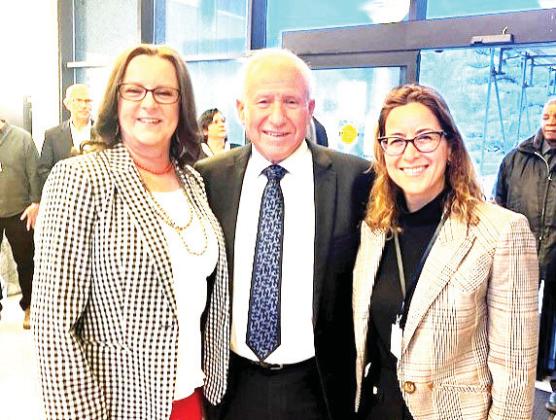Castro County resident Laura Hart, from Hart, Texas was recently invited to attend the BARD 45th Anniversary seminar and reception held at the National Arboretum in Washington D.C. on April 9 as a woman in agriculture representing the state of Texas.
Hart said it was a great opportunity and she never felt more welcome getting to meet the Israeli delegation and other agricultural representatives.
Hart has been connected to agriculture for many years, with she and her husband, Vic, living on and running a multigenerational farm in Hart.
The United States-Israel Binational Agricultural Research and Development Fund (BARD) is a competitive funding program supporting collaborative agricultural research in mutual interest between the two countries.
Hart said the evening began with a seminar featuring experts who discussed promising prospects on emerging topics related to a shared vision and potential solutions for challenges ahead.
Professor Jason Hallstrom, program director, CISE/CNS National Science Foundation, spoke about precision agriculture’s key role in useinspired basic research. The presentation summarized active programs and investments across the foundation and potential opportunities and directions including artifi cial intelligence (AI) research goals.
Dr. Ron Porat, Department of Postharvest Science, ARO, the Vocani , discussed the fact that 10,000 tons of organic food waste in landfills emit the same amount of carbon as 6,639 cars on the road each year. Studies by the U.N. Food and Agriculture Organization indicate that a third of all food and 45 percent of fruit and vegetables are lost or wasted along the supply chain. Current challenges facing the fruit and vegetable supply chain are the restriction of fungicides, banning of plastic package and delays. Dr. Porat addressed how investment in research and development will reduce food loss and wastage.
Rod Snyder, Senior Advisor for Agriculture to the EPA Administrator discussed solutions to manage and optimized consumption of water in agricultural systems, saying any solutions will require a science-based consensus among all stakeholders across the food and agriculture value chain.
Dr. Michael Levy, chief scientist, Ministry of Agriculture in Israel and Mike Green, ArVA EC&T discussed the exponential growth of solar photovoltaic energy replacing fossil-fueled electricity as the strongest weapon against global warming, saying the ground-mounted power plant is no longer easily satisfied by non-arable land. They said one solution could be co-location – or agrivoltaics/dual-use solar, which is defined as agricultural production underneath solar panels or adjacent to solar panels.
Agrivoltaics examples of regulation include that agricultural use of land must be guaranteed; ag yield must be at least 66 percent of reference yield (Israel 70 percent); land loss after installation of system max 10 percent cat. 1 or 15 percent cat. 2; verified light availability, light homogeneity and water availability and dismantling possible without more significant damage to soil or leaving construction residue.
The day was completed with a dinner reception which marked BARDS’s anniversary, honored by the Israeli Minister of Agriculture and Rural development, Avi Dichter, and the Ambassador of Israel to the U.S., Michael Herzog.
Dichter spoke about visiting farmers in the area where the Oct. 7. 2023 attack took place, telling of a story of a farmer in a wheelchair. He said the farmer was more concerned with seeing green, flourishing fields again than telling his story of losing his leg, his son with the Israeli bomb squad and his wife murdered in the attack, noting how resilient the people of Israel are. He said the farmer told him that his leg wouldn’t grow back and that his wife and son were not coming back. Dichter said there is no one more optimistic than a farmer.

